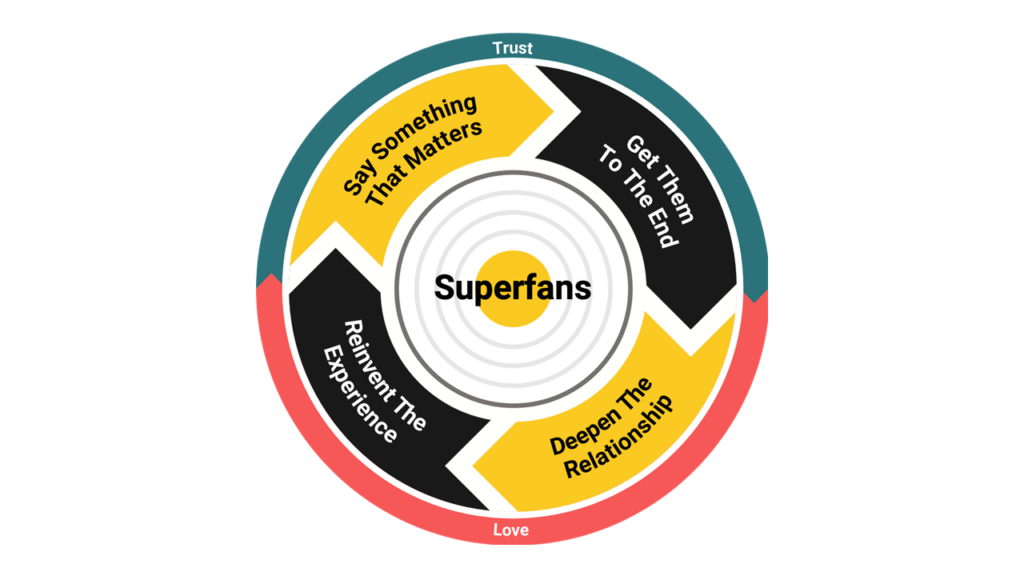Showrunning Done Right: How One Company Proved the ROI of Its Engrossing Video Series
Do you ever feel that when it comes to content marketing, you can either focus on exceptional creative or on lead generation…but not necessarily on both?
It shouldn’t feel like that, but it sometimes does. Marketers are stretched so thin and so strapped for resources — of time, of budget, of talent — that they often must choose between creating something truly stellar and creating something with a tangible ROI.
Of course we think that approach is short-sighted. We think that as ever-greater volumes of mediocre content flood our industries, the brands that say something that truly matters will be the only ones that float above the rest. We think good content and effective content are synonymous. Admittedly, though, we understand that securing the budget to make high-quality, deeply resonant content (and, ultimately, gaining the metrics to validate it) can be a bit of a long game.
Imagine our excitement when we found a branded series that seems to have done both. It’s a show I honestly could not stop watching — and what’s more, its creators have been able to assign a dollar value to every lead the show has attracted, which helps demonstrate the show’s tangible ROI. The company’s typical MQL price has hovered around €900; the price of MQLs coming in via the show is about €25. The show is a cheaper way for the company to gain leads and, as a bonus, it encourages repeat visits, exposes potential customers to more qualitative angles of the business, and humanizes the company.
That company is 360Learning, a B2B tech company that creates internal learning software. It launched a 13-episode weekly documentary series just before the start of the COVID-19 pandemic. Onboarding Joei takes viewers behind the scenes of the onboarding process at this fast-growing startup.
The show is new, but it’s already clearly been an effective tool in generating trust and love from its audience. We spoke with showrunner Nicolas Merlaud, who said the show has been phenomenally well-received — and has even generated a material number of leads for the sales team.
In creating the show, Nicolas made a series of strategic and artful decisions that now, as we analyze them, we can plot along the showrunner’s circle. The showrunner’s circle is a methodology you can use to create someone’s favorite show. To do that, you need to earn trust and love: that is, be consistently competent and emotionally engaging. Inevitably, you’ll encounter four big challenges in trying to do that — all four of which the showrunner’s circle describes.

With this show, Nicolas masterfully discovered how to say something that matters, get viewers to the end of each episode, and deepen the relationship with fans. As a result, he is well on his way to developing true superfans for 360Learning.

The first challenge any showrunner faces is to say something that matters. Sound obvious? Yes. Often overlooked, especially by marketers? Also, sadly, yes. Saying something that matters with your show gives audiences necessary motivation to subscribe — to your beliefs and ideas, which then leads them to subscribe to the feed or list. The piece of a show that does the heavy lifting here is the show’s overall premise.
As an online learning platform, 360Learning helps customers create effective, efficient onboarding processes. By using the show to lift the proverbial hood on their own onboarding, the company immediately demonstrated that it could personally understand the problems and moments of tension its customers face.
“I needed to make sure I was creating content that was interesting,” explained Nicolas. “Before I joined 360Learning, I had my own video production company and was my own boss. This is the first company I’ve ever experienced. I joined the company six months before launching the show, and I lived and experienced the hurdles of onboarding. I found that getting started in the startup world can be hard, because there are so many expectations for each team member. Within my first six months, I learned how to have an impact at a startup [like Life360].
“So when I learned that I would have a new colleague, Joei, starting as Director of Content, I thought it could be an interesting idea for a show. I thought she would likely face the same hurdles that I did — the same hurdles other people beginning new jobs at startups all face.”
As a first step, Nicolas identified his show’s premise: a behind-the-scenes look at what really happens when you start a job in a hyper-growth tech startup. Importantly, he derived that premise from an emotional, personal experience. Nicolas thought Joei’s onboarding experience would constitute an interesting, emotionally engaging show because he had just lived that experience himself. He inherently understood that the challenges both a new employee and the company they work for face are somewhat universal — and thus emotionally resonant with viewers.
This, I think, is the first place where Nicolas really did showrunning right. The first step in creating any show is to say something that matters. A shocking number of B2B shows don’t do that. Too many don’t have a cohesive premise that can propel the viewer or listener throughout each episode. Too many have a premise that falls flat — it might be peripherally interesting, but it doesn’t pack an emotional punch for the audience.
The premise Nicolas selected was universal — onboarding is something every company and every new employee must face. The hook that makes the premise unique to 360Learning is the second part of the show’s title: Joei.
This isn’t just a show about onboarding. It’s a show about onboarding a specific person. This ended up being a brilliant choice, because Joei turned out to be an excellent protagonist. At once warm and engaging and fiercely opinionated, Joei immediately captures the viewer’s attention. She’s the definition of a “round” character — she’s high-performing, talented, and flawed. We find ourselves rooting for her after just a few episodes. We know she’s a real person (we can find her on Twitter and LinkedIn!), and this is a real documentary, filmed and released in near real-time, about her real job and her real life. We become personally invested in Joei’s story, and we’re ready to go on this journey with her to find out what happens in her first three months on the job.

The second challenge a showrunner faces in trying to create their audience’s favorite show is to get them to the end. Once they subscribe, thanks to the premise, the next hurdle is to ensure they stay. How do you create an experience your audience won’t want to leave? You have to construct your episode format with purpose — the structure of your episode and the way it flows, but also how the performance feels. Thus, if the show’s premise provides motivation to subscribe, the episode format provides the audience motivation to stay.
It doesn’t take long to become emotionally invested in Joei’s story, but a less artfully-produced show could waste little time losing that preciously cultivated attention. In his careful planning of each episode, Nicolas once again exemplifies exceptional showrunning. His thoughtfully-constructed episode arcs ensure viewers feel compelled to watch each episode until the end.
Nicolas assigns much of the credit for this feat to one of his favorite books: The Anatomy of a Story, by John Truby. “I’m a creative guy, but I’m also a math guy,” said Nicolas. “In this book, Truby brings a lot of methodology into the writing process. He writes that in every story, you have a hero who has a weakness, a desire to overcome that weakness, an obstacle in the way of overcoming that weakness, and a plan to overcome the obstacle. And then finally, there is the big reveal, where the audience finds out: did the hero overcome that weakness?
“On a series level, I tried to think about how the story would go before I began filming. I talked to Joei a lot before she joined. I tried to think about her desire: where was she coming from, why did she want to join the company, what did she want to do there. In the show, we find that she wants to create a blog. As the viewer, though, we ultimately don’t care if she creates the blog. We care about whether or not she’ll be happy in her new job. And I knew viewers would need to see obstacles in the way of these goals.”
Nicolas identified the overarching intentions of the series (Will Joei succeed in creating the blog? More importantly, will she be happy in her new role?), and he also identified micro-intentions and obstacles for each individual episode. This constant build and release of tension kept audiences engaged through all five minutes of each episode. It kept them watching (and deeply emotionally invested, as evidenced by their LinkedIn comments on the penultimate episode) until the end.

The show Nicolas filmed wasn’t scripted, but that doesn’t mean that creating dramatic tension required no planning. “For every episode, I filled out the Show Bible,” said Nicolas. “I made sure each episode had a hook, an emotional payoff, and the cliff for the next episode. For me, this tool was extremely helpful.”

Once a showrunner overcomes the first two challenges, it’s time to deepen the relationship and move from focusing on trust to focusing on love. Trust happens when competence meets consistency. If your show offers a premise that matters to the audience, and your episodes provide a good enough experience that an audience will want to stick with it, then you’ve done something trustworthy. I trust my dentist, because he does the job of a dentist, consistently. But love? That comes from a deeper, more personal and emotional connection. After you provide motivation to subscribe and motivation to stay, you also need to provide your audience with the motivation to act — whatever action might make sense for your relationship. Whereas you previously focused on the premise and the episode format, it’s now time to focus on the more subtle performance and community-building things you can do inside and around the show. It’s time to turn your audience into a community, and viewers or listeners into superfans.
Nicolas’ original goal in launching Onboarding Joei was to create awareness of 360Learning in the US (Nicolas and Joei, among others in the documentary, are based in Paris). What he found, though, was that the show ended up doing much more than building brand awareness. Instead, it truly built brand affinity.
“People were very enthusiastic,” Nicolas said. “We had a lot of comments and feedback, particularly when employees shared the trailers on their personal networks.”
People were so enthusiastic, in fact, that they kept coming back to the 360Learning website. So many people came to the site via the show that the marketing team needed to create a new classification system for them in Marketo.
“We created a problem with the show, because we had to create this new type of conversion widget, which was qualified subscribers,” laughed Nicolas. “And in a way it’s a good problem, because we’re creating a new “type” of person who visits the website, and they’re coming back — they love [360Learning] because of the show. We now share those leads with the rest of the department, so they become marketing-qualified leads (MQLs).”
Nicolas’ ability to tie the show to MQLs is a true differentiator, because it allowed him to demonstrate real ROI — something many content creators find challenging.
“I was able to show that I could bring in a lot of qualified subscribers,” Nicolas said. “Moreover, I could prove the show’s ROI. I know how much demand gen spends for one qualified lead, and I know how much I spend production-wise for each episode.Then, I compute the show cost per qualified lead, and I can show the team the ROI of my show — and the price per lead is cheaper than what demand gen is spending. This is how I scaled and got more budget to produce more shows.”

Here, we arrive at the fourth and final challenge a showrunner faces when trying to make their audience’s favorite show: reinventing the experience. Even the best experience grows stale, which hurts your ability to spark action. People unsubscribe from things they once loved. People bail from episodes they once consumed end-to-end. Finding the Repeatable Playbook is just a starting point. It must be reinvented in small, refreshing ways over time, so you can continue to Say Something That Matters, Get Them to the End, and Deepen Relationships — and on and on the showrunner’s circle spins.
Ultimately, everything Nicolas did — from crafting a compelling premise, to planning captivating episodes, to turning fans of the show into fans of the company — led to one next step. By succeeding with his first show, Nicolas bought himself more — more time to create, more buy-in, more budget to produce more shows.
And ultimately, that’s the whole point of launching a show — to continue launching shows. Onboarding Joei has secured superfans who’ve turned into customers and demonstrated trust and love for the company. To keep these superfans on board (I did, in fact, intend that pun), Nicolas and his team now need to make something new. They need to reinvent what worked well for them with their first series, so they can continue to enthrall and delight their superfans — and continue generating qualified subscribers for the company.
For a showrunner like Nicolas, the opportunity for consistent creativity and constant reinvention is the goal. When it all works — as it did for Onboarding Joei — there’s one incredible prize:
You get to keep going.

A somewhat accidental marketer, I’m first and foremost a writer. I’ve spent a decade working with global brands to craft on-target content and streamline complex ideas into clear (and even…exciting?!) language. Now, I get to spend every day immersed in content and strategy here, as Managing Editor of Marketing Showrunners, at my company, Molly Donovan Content & Communications. I’m thrilled to be a part of this community of eager next-generation marketers and marketing showrunners.
Reach out! molly@mshowrunners.com

